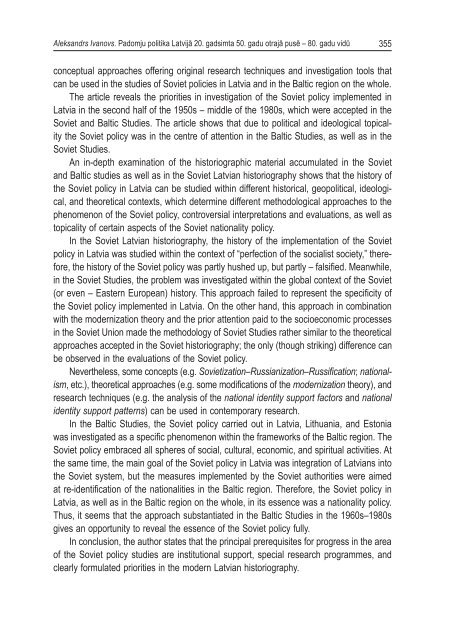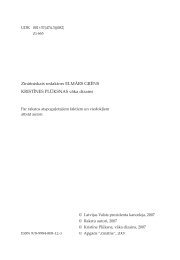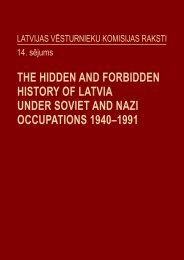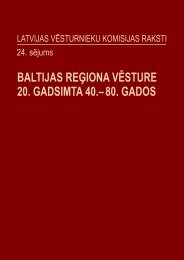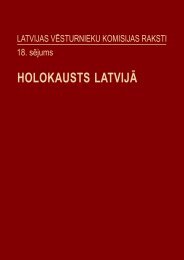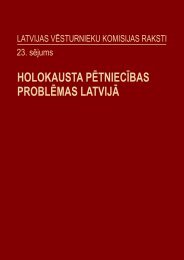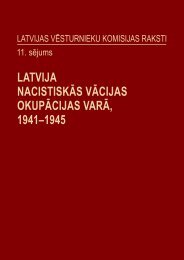- Page 1:
LATVIJAS VĒSTURNIEKU KOMISIJAS RAK
- Page 4 and 5:
Latvijas Vēsturnieku komisija LATV
- Page 6 and 7:
SATURS Priekšvārds . . . . . . .
- Page 8 and 9:
Saturs Uldis Neiburgs Association o
- Page 10 and 11:
PRIEKŠVĀRDS Latvijas Vēsturnieku
- Page 12 and 13:
Priekšvārds atspoguļota literat
- Page 14 and 15:
PADOMJU OKUPĀCIJA LATVIJĀ (1940-1
- Page 16 and 17:
Gints Zelmenis Kultūras pārraudz
- Page 18 and 19:
Gints Zelmenis. Kultūras pārraudz
- Page 20 and 21:
Gints Zelmenis. Kultūras pārraudz
- Page 22 and 23:
Gints Zelmenis. Kultūras pārraudz
- Page 24 and 25:
Gints Zelmenis. Kultūras pārraudz
- Page 26 and 27:
Gints Zelmenis. Kultūras pārraudz
- Page 28 and 29:
Gints Zelmenis. Kultūras pārraudz
- Page 30 and 31:
Gints Zelmenis. Kultūras pārraudz
- Page 32 and 33:
Gints Zelmenis. Kultūras pārraudz
- Page 34 and 35:
Gints Zelmenis. Kultūras pārraudz
- Page 36 and 37:
Gints Zelmenis. Kultūras pārraudz
- Page 38 and 39:
Gints Zelmenis. Kultūras pārraudz
- Page 40 and 41:
Gints Zelmenis. Kultūras pārraudz
- Page 42 and 43:
Gints Zelmenis. Kultūras pārraudz
- Page 44 and 45:
Gints Zelmenis. Kultūras pārraudz
- Page 46 and 47:
NACISTISKĀS VĀCIJAS OKUPĀCIJA LA
- Page 48 and 49:
Inesis Feldmanis Nacistu okupācija
- Page 50 and 51:
Inesis Feldmanis. Nacistu okupācij
- Page 52 and 53:
Inesis Feldmanis. Nacistu okupācij
- Page 54 and 55:
Inesis Feldmanis. Nacistu okupācij
- Page 56 and 57:
Inesis Feldmanis. Nacistu okupācij
- Page 58 and 59:
Inesis Feldmanis. Nacistu okupācij
- Page 60 and 61:
Inesis Feldmanis. Nacistu okupācij
- Page 62 and 63:
Kaspars Zellis Nacionālsociālisti
- Page 64 and 65:
Kaspars Zellis. Nacionālsociālist
- Page 66 and 67:
Kaspars Zellis. Nacionālsociālist
- Page 68 and 69:
Kaspars Zellis. Nacionālsociālist
- Page 70 and 71:
Kaspars Zellis. Nacionālsociālist
- Page 72 and 73:
Kaspars Zellis. Nacionālsociālist
- Page 74 and 75:
Kaspars Zellis. Nacionālsociālist
- Page 76 and 77:
Kaspars Zellis. Nacionālsociālist
- Page 78 and 79:
Kaspars Zellis. Nacionālsociālist
- Page 80 and 81:
Kaspars Zellis. Nacionālsociālist
- Page 82 and 83:
Kaspars Zellis. Nacionālsociālist
- Page 84 and 85:
Kaspars Zellis. Nacionālsociālist
- Page 86 and 87:
Kārlis Kangeris. Baltvācieši Lat
- Page 88 and 89:
Kārlis Kangeris. Baltvācieši Lat
- Page 90 and 91:
Kārlis Kangeris. Baltvācieši Lat
- Page 92 and 93:
Kārlis Kangeris. Baltvācieši Lat
- Page 94 and 95:
Kārlis Kangeris. Baltvācieši Lat
- Page 96 and 97:
Kārlis Kangeris. Baltvācieši Lat
- Page 98 and 99:
Kārlis Kangeris. Baltvācieši Lat
- Page 100 and 101:
Kārlis Kangeris. Baltvācieši Lat
- Page 102 and 103:
Kārlis Kangeris. Baltvācieši Lat
- Page 104 and 105:
Kārlis Kangeris. Baltvācieši Lat
- Page 106 and 107:
Kārlis Kangeris. Baltvācieši Lat
- Page 108 and 109:
Kārlis Kangeris. Baltvācieši Lat
- Page 110 and 111:
Kārlis Kangeris. Baltvācieši Lat
- Page 112 and 113:
Kārlis Kangeris. Baltvācieši Lat
- Page 114 and 115:
Kārlis Kangeris. Baltvācieši Lat
- Page 116 and 117:
Kārlis Kangeris. Baltvācieši Lat
- Page 118 and 119:
Kārlis Kangeris. Baltvācieši Lat
- Page 120 and 121:
Kārlis Kangeris. Baltvācieši Lat
- Page 122 and 123:
Kārlis Kangeris. Baltvācieši Lat
- Page 124 and 125:
Uldis Neiburgs. LPKDA un tās dokum
- Page 126 and 127:
Uldis Neiburgs. LPKDA un tās dokum
- Page 128 and 129:
Uldis Neiburgs. LPKDA un tās dokum
- Page 130 and 131:
Uldis Neiburgs. LPKDA un tās dokum
- Page 132 and 133:
Uldis Neiburgs. LPKDA un tās dokum
- Page 134 and 135:
Uldis Neiburgs. LPKDA un tās dokum
- Page 136 and 137:
Uldis Neiburgs. LPKDA un tās dokum
- Page 138 and 139:
Uldis Neiburgs. LPKDA un tās dokum
- Page 140 and 141:
Uldis Neiburgs. LPKDA un tās dokum
- Page 142 and 143:
Uldis Neiburgs. LPKDA un tās dokum
- Page 144 and 145:
Uldis Neiburgs. LPKDA un tās dokum
- Page 146 and 147:
Uldis Neiburgs. LPKDA un tās dokum
- Page 148 and 149:
Uldis Neiburgs. LPKDA un tās dokum
- Page 150 and 151:
Uldis Neiburgs. LPKDA un tās dokum
- Page 152 and 153:
Uldis Neiburgs. LPKDA un tās dokum
- Page 154 and 155:
Uldis Neiburgs. LPKDA un tās dokum
- Page 156 and 157:
Uldis Neiburgs. LPKDA un tās dokum
- Page 158 and 159:
Uldis Neiburgs. LPKDA un tās dokum
- Page 160 and 161:
Uldis Neiburgs. LPKDA un tās dokum
- Page 162 and 163:
Uldis Neiburgs. LPKDA un tās dokum
- Page 164 and 165:
Uldis Neiburgs. LPKDA un tās dokum
- Page 166 and 167:
Uldis Neiburgs. LPKDA un tās dokum
- Page 168 and 169:
Uldis Neiburgs. LPKDA un tās dokum
- Page 170 and 171:
Uldis Neiburgs. LPKDA un tās dokum
- Page 172 and 173:
Andris Kūla Metropolīts Sergijs u
- Page 174 and 175:
Andris Kūla. Metropolīts Sergijs
- Page 176 and 177:
Andris Kūla. Metropolīts Sergijs
- Page 178 and 179:
Andris Kūla. Metropolīts Sergijs
- Page 180 and 181:
Andris Kūla. Metropolīts Sergijs
- Page 182 and 183:
Andris Kūla. Metropolīts Sergijs
- Page 184 and 185:
Andris Kūla. Metropolīts Sergijs
- Page 186 and 187:
Andris Kūla. Metropolīts Sergijs
- Page 188 and 189:
Andris Kūla. Metropolīts Sergijs
- Page 190 and 191:
Andris Kūla. Metropolīts Sergijs
- Page 192 and 193:
Andris Kūla. Metropolīts Sergijs
- Page 194 and 195:
Andris Kūla. Metropolīts Sergijs
- Page 196 and 197:
Andris Kūla. Metropolīts Sergijs
- Page 198 and 199:
Andris Kūla. Metropolīts Sergijs
- Page 200 and 201:
Andris Kūla. Metropolīts Sergijs
- Page 202 and 203:
Andris Kūla. Metropolīts Sergijs
- Page 204 and 205:
Andris Kūla. Metropolīts Sergijs
- Page 206 and 207:
Andris Kūla. Metropolīts Sergijs
- Page 208 and 209:
Andris Kūla. Metropolīts Sergijs
- Page 210 and 211:
Andris Kūla. Metropolīts Sergijs
- Page 212 and 213:
Andris Kūla. Metropolīts Sergijs
- Page 214 and 215:
Andris Kūla. Metropolīts Sergijs
- Page 216 and 217:
Andris Kūla. Metropolīts Sergijs
- Page 218 and 219:
Kārlis Kangeris, Uldis Neiburgs, R
- Page 220 and 221:
Kārlis Kangeris, Uldis Neiburgs, R
- Page 222 and 223:
Kārlis Kangeris, Uldis Neiburgs, R
- Page 224 and 225:
Kārlis Kangeris, Uldis Neiburgs, R
- Page 226 and 227:
Kārlis Kangeris, Uldis Neiburgs, R
- Page 228 and 229:
Kārlis Kangeris, Uldis Neiburgs, R
- Page 230 and 231:
Kārlis Kangeris, Uldis Neiburgs, R
- Page 232 and 233:
Kārlis Kangeris, Uldis Neiburgs, R
- Page 234 and 235:
Kārlis Kangeris, Uldis Neiburgs, R
- Page 236 and 237:
Kārlis Kangeris, Uldis Neiburgs, R
- Page 238 and 239:
Kārlis Kangeris, Uldis Neiburgs, R
- Page 240 and 241:
Kārlis Kangeris, Uldis Neiburgs, R
- Page 242 and 243:
Kārlis Kangeris, Uldis Neiburgs, R
- Page 244 and 245:
Kārlis Kangeris, Uldis Neiburgs, R
- Page 246 and 247:
Kārlis Kangeris, Uldis Neiburgs, R
- Page 248 and 249:
Kārlis Kangeris, Uldis Neiburgs, R
- Page 250 and 251:
Kārlis Kangeris, Uldis Neiburgs, R
- Page 252 and 253:
PADOMJU OKUPĀCIJA LATVIJĀ (1944-1
- Page 254 and 255:
Juris Pavlovičs Latvijas reokupāc
- Page 256 and 257:
Juris Pavlovičs. Latvijas reokupā
- Page 258 and 259:
Juris Pavlovičs. Latvijas reokupā
- Page 260 and 261:
Juris Pavlovičs. Latvijas reokupā
- Page 262 and 263:
Juris Pavlovičs. Latvijas reokupā
- Page 264 and 265:
Juris Pavlovičs. Latvijas reokupā
- Page 266 and 267:
Juris Pavlovičs. Latvijas reokupā
- Page 268 and 269:
Juris Pavlovičs. Latvijas reokupā
- Page 270 and 271:
Juris Pavlovičs. Latvijas reokupā
- Page 272 and 273:
Antonijs Zunda Baltijas jautājums
- Page 274 and 275:
Antonijs Zunda. Baltijas jautājums
- Page 276 and 277:
Antonijs Zunda. Baltijas jautājums
- Page 278 and 279:
Antonijs Zunda. Baltijas jautājums
- Page 280 and 281:
Antonijs Zunda. Baltijas jautājums
- Page 282 and 283:
Antonijs Zunda. Baltijas jautājums
- Page 284 and 285:
Antonijs Zunda. Baltijas jautājums
- Page 286 and 287:
Antonijs Zunda. Baltijas jautājums
- Page 288 and 289:
Antonijs Zunda. Baltijas jautājums
- Page 290 and 291:
Antonijs Zunda. Baltijas jautājums
- Page 292 and 293:
Antonijs Zunda. Baltijas jautājums
- Page 294 and 295:
Antonijs Zunda. Baltijas jautājums
- Page 296 and 297:
Antonijs Zunda. Baltijas jautājums
- Page 298 and 299:
Antonijs Zunda. Baltijas jautājums
- Page 300 and 301:
Antonijs Zunda. Baltijas jautājums
- Page 302 and 303:
Antonijs Zunda. Baltijas jautājums
- Page 304 and 305:
Antonijs Zunda. Baltijas jautājums
- Page 306 and 307: Aleksandrs Ivanovs Padomju politika
- Page 308 and 309: Aleksandrs Ivanovs. Padomju politik
- Page 310 and 311: Aleksandrs Ivanovs. Padomju politik
- Page 312 and 313: Aleksandrs Ivanovs. Padomju politik
- Page 314 and 315: Aleksandrs Ivanovs. Padomju politik
- Page 316 and 317: Aleksandrs Ivanovs. Padomju politik
- Page 318 and 319: Aleksandrs Ivanovs. Padomju politik
- Page 320 and 321: Aleksandrs Ivanovs. Padomju politik
- Page 322 and 323: Aleksandrs Ivanovs. Padomju politik
- Page 324 and 325: Aleksandrs Ivanovs. Padomju politik
- Page 326 and 327: Aleksandrs Ivanovs. Padomju politik
- Page 328 and 329: Aleksandrs Ivanovs. Padomju politik
- Page 330 and 331: Aleksandrs Ivanovs. Padomju politik
- Page 332 and 333: Aleksandrs Ivanovs. Padomju politik
- Page 334 and 335: Aleksandrs Ivanovs. Padomju politik
- Page 336 and 337: Aleksandrs Ivanovs. Padomju politik
- Page 338 and 339: Aleksandrs Ivanovs. Padomju politik
- Page 340 and 341: Aleksandrs Ivanovs. Padomju politik
- Page 342 and 343: Aleksandrs Ivanovs. Padomju politik
- Page 344 and 345: Aleksandrs Ivanovs. Padomju politik
- Page 346 and 347: Aleksandrs Ivanovs. Padomju politik
- Page 348 and 349: Aleksandrs Ivanovs. Padomju politik
- Page 350 and 351: Aleksandrs Ivanovs. Padomju politik
- Page 352 and 353: Aleksandrs Ivanovs. Padomju politik
- Page 354 and 355: Aleksandrs Ivanovs. Padomju politik
- Page 358 and 359: Daina Bleiere. LKP organizācijas s
- Page 360 and 361: Daina Bleiere. LKP organizācijas s
- Page 362 and 363: Daina Bleiere. LKP organizācijas s
- Page 364 and 365: Daina Bleiere. LKP organizācijas s
- Page 366 and 367: Daina Bleiere. LKP organizācijas s
- Page 368 and 369: Daina Bleiere. LKP organizācijas s
- Page 370 and 371: Daina Bleiere. LKP organizācijas s
- Page 372 and 373: Daina Bleiere. LKP organizācijas s
- Page 374 and 375: Daina Bleiere. LKP organizācijas s
- Page 376 and 377: Ainārs Bambals. Latvijas PSR VDM i
- Page 378 and 379: Ainārs Bambals. Latvijas PSR VDM i
- Page 380 and 381: Ainārs Bambals. Latvijas PSR VDM i
- Page 382 and 383: Ainārs Bambals. Latvijas PSR VDM i
- Page 384 and 385: Ainārs Bambals. Latvijas PSR VDM i
- Page 386 and 387: Ainārs Bambals. Latvijas PSR VDM i
- Page 388 and 389: Ainārs Bambals. Latvijas PSR VDM i
- Page 390 and 391: Ainārs Bambals. Latvijas PSR VDM i
- Page 392 and 393: Ainārs Bambals. Latvijas PSR VDM i
- Page 394 and 395: Ainārs Bambals. Latvijas PSR VDM i
- Page 396 and 397: Ainārs Bambals. Latvijas PSR VDM i
- Page 398 and 399: Ainārs Bambals. Latvijas PSR VDM i
- Page 400 and 401: Ainārs Bambals. Latvijas PSR VDM i
- Page 402 and 403: Ritvars Jansons Kriminālvajāšana
- Page 404 and 405: Ritvars Jansons. Kriminālvajāšan
- Page 406 and 407:
Ritvars Jansons. Kriminālvajāšan
- Page 408 and 409:
Ritvars Jansons. Kriminālvajāšan
- Page 410 and 411:
Ritvars Jansons. Kriminālvajāšan
- Page 412 and 413:
Ritvars Jansons. Kriminālvajāšan
- Page 414 and 415:
Ritvars Jansons. Kriminālvajāšan
- Page 416 and 417:
Ritvars Jansons. Kriminālvajāšan
- Page 418 and 419:
Ritvars Jansons. Kriminālvajāšan
- Page 420 and 421:
Ritvars Jansons. Kriminālvajāšan
- Page 422 and 423:
Ritvars Jansons. Kriminālvajāšan
- Page 424 and 425:
Ritvars Jansons. Kriminālvajāšan
- Page 426 and 427:
Heinrihs Strods Trimdas izdevumu ce
- Page 428 and 429:
Heinrihs Strods. Trimdas izdevumu c
- Page 430 and 431:
Heinrihs Strods. Trimdas izdevumu c
- Page 432 and 433:
Heinrihs Strods. Trimdas izdevumu c
- Page 434 and 435:
Heinrihs Strods. Trimdas izdevumu c
- Page 436 and 437:
Heinrihs Strods. Trimdas izdevumu c
- Page 438 and 439:
Heinrihs Strods. Trimdas izdevumu c
- Page 440 and 441:
Heinrihs Strods. Trimdas izdevumu c
- Page 442 and 443:
Heinrihs Strods. Trimdas izdevumu c
- Page 444 and 445:
Heinrihs Strods. Trimdas izdevumu c
- Page 446 and 447:
Heinrihs Strods. Trimdas izdevumu c
- Page 448 and 449:
Heinrihs Strods. Trimdas izdevumu c
- Page 450 and 451:
Heinrihs Strods. Trimdas izdevumu c
- Page 452 and 453:
Heinrihs Strods. Trimdas izdevumu c
- Page 454 and 455:
Ilgvars Butulis. Ārzemju informāc
- Page 456 and 457:
Ilgvars Butulis. Ārzemju informāc
- Page 458 and 459:
Ilgvars Butulis. Ārzemju informāc
- Page 460 and 461:
Ilgvars Butulis. Ārzemju informāc
- Page 462 and 463:
Ilgvars Butulis. Ārzemju informāc
- Page 464 and 465:
Ilgvars Butulis. Ārzemju informāc
- Page 466 and 467:
Ilgvars Butulis. Ārzemju informāc
- Page 468 and 469:
Ilgvars Butulis. Ārzemju informāc
- Page 470 and 471:
Ilgvars Butulis. Ārzemju informāc
- Page 472 and 473:
Ilgvars Butulis. Ārzemju informāc
- Page 474 and 475:
NOVADPĒTNIEKA VĀKUMS COLLECTION O
- Page 476 and 477:
Irēna Šaicāne. Viļakas jaunieš
- Page 478 and 479:
Irēna Šaicāne. Viļakas jaunieš
- Page 480 and 481:
Irēna Šaicāne. Viļakas jaunieš
- Page 482 and 483:
Irēna Šaicāne. Viļakas jaunieš
- Page 484 and 485:
Irēna Šaicāne. Viļakas jaunieš
- Page 486 and 487:
Irēna Šaicāne. Viļakas jaunieš
- Page 488 and 489:
Irēna Šaicāne. Viļakas jaunieš
- Page 490 and 491:
Irēna Šaicāne. Viļakas jaunieš
- Page 492 and 493:
Irēna Šaicāne. Viļakas jaunieš
- Page 494 and 495:
Irēna Šaicāne. Viļakas jaunieš
- Page 496 and 497:
Irēna Šaicāne. Viļakas jaunieš
- Page 498 and 499:
Irēna Šaicāne. Viļakas jaunieš
- Page 500 and 501:
Irēna Šaicāne. Viļakas jaunieš
- Page 502 and 503:
Irēna Šaicāne. Viļakas jaunieš
- Page 504 and 505:
Irēna Krājuma Šaicāne. rakstu V


